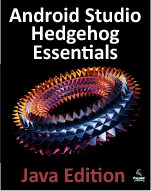Introduction - Android Studio 6
| Previous | Table of Contents | Next |
| Table of Contents | Setting up an Android Studio Development Environment |
The goal of this book is to teach the skills necessary to develop Android based applications using the Android Studio Integrated Development Environment (IDE) and the Android 6 Software Development Kit (SDK).
Beginning with the basics, this book provides an outline of the steps necessary to set up an Android development and testing environment. An overview of Android Studio is included covering areas such as tool windows, the code editor and the Designer tool. An introduction to the architecture of Android is followed by an in-depth look at the design of Android applications and user interfaces using the Android Studio environment. More advanced topics such as database management, content providers and intents are also covered, as are touch screen handling, gesture recognition, camera access and the playback and recording of both video and audio. This edition of the book also covers printing, transitions and cloud-based file storage.
The concepts of material design are also covered in detail, including the use of floating action buttons, Snackbars, tabbed interfaces, card views, navigation drawers and collapsing toolbars.
In addition to covering general Android development techniques, the book also includes Google Play specific topics such as implementing maps using the Google Maps Android API, in-app billing and submitting apps to the Google Play Developer Console.
Chapters also cover advanced features of Android Studio such as Gradle build configuration and the implementation of build variants to target multiple Android device types from a single project code base. Assuming you already have some Java programming experience, are ready to download Android Studio and the Android SDK, have access to a Windows, Mac or Linux system and ideas for some apps to develop, you are ready to get started.
Downloading the Code Samples
The source code and Android Studio project files for the examples contained in this book are available for download at:
http://www.ebookfrenzy.com/code/AndroidStudioA6Book.zip
The steps to load a project from the code samples into Android Studio are as follows:
1. From the Welcome to Android Studio dialog, select the Open an existing Android Studio project option.
2. In the project selection dialog, navigate to and select the folder containing the project to be imported and click on OK.
Errata
While we make every effort to ensure the accuracy of the content of this book, it is inevitable that a book covering a subject area of this size and complexity may include some errors and oversights. Any known issues with the book will be outlined, together with solutions, at the following URL:
http://www.ebookfrenzy.com/errata/androidstudioA6.html
In the event that you find an error not listed in the errata, please let us know by emailing our technical support team at [email protected]. They are there to help you and will work to resolve any problems you may encounter.
| Previous | Table of Contents | Next |
| Table of Contents | Setting up an Android Studio Development Environment |



